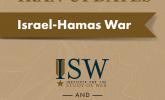Russian Offensive Campaign Assessment, March 27, 2024
March 27, 2024 - ISW Press
The UN Human Rights Monitoring Mission in Ukraine (HRMMU) released its 38th report on the human rights situation in Ukraine on March 26, confirming several of ISW’s longstanding assessments about Russia’s systematic violations of international human rights and humanitarian law in occupied territories and towards Ukrainian prisoners of war (POWs). The HRMMU report details activities between December 1, 2023 and February 29 2024, and includes new findings about Russia’s abuse of Ukrainian POWs during this timeframe, based on interviews with 60 recently released male POWs. Nearly all of the POWs that HRMMU interviewed detailed how they were tortured by Russian forces with beatings and electric shocks and threatened with execution, and over half of the interviewees experienced sexual violence.










